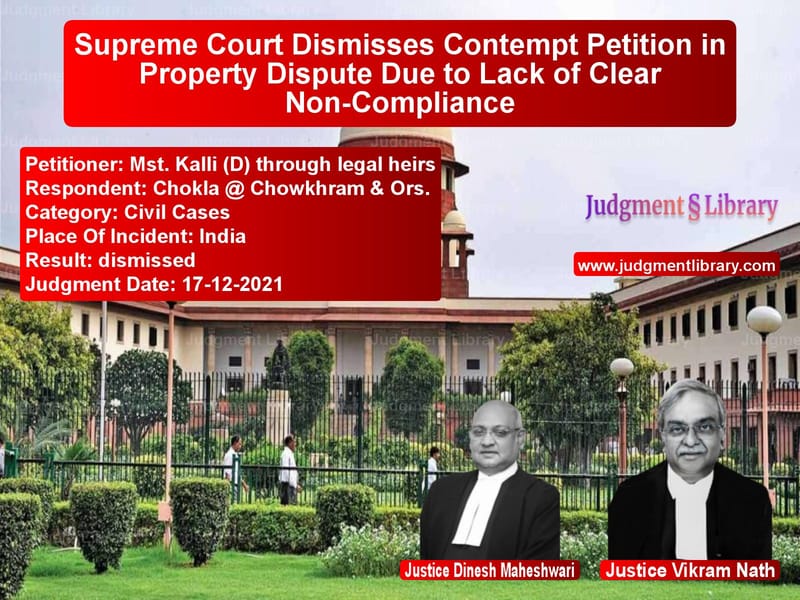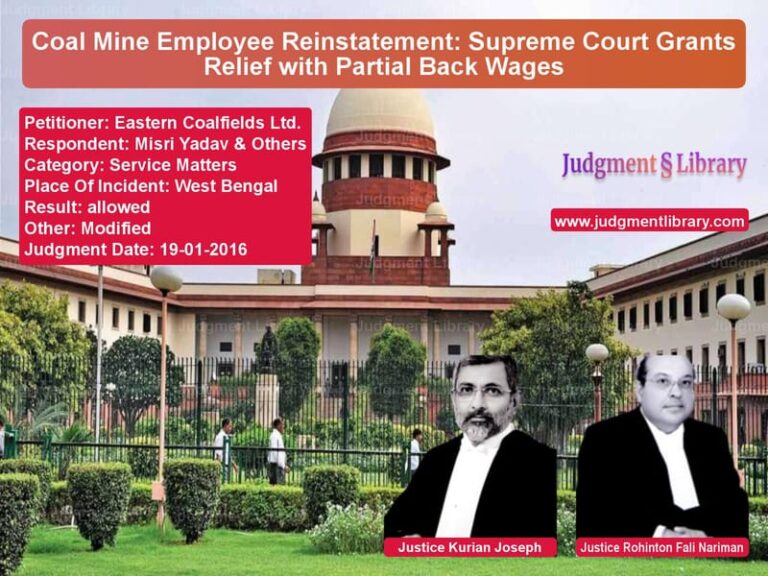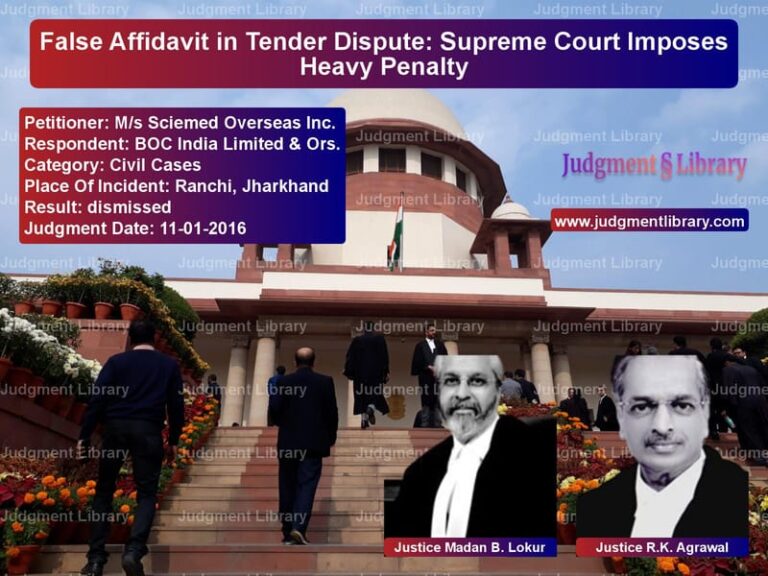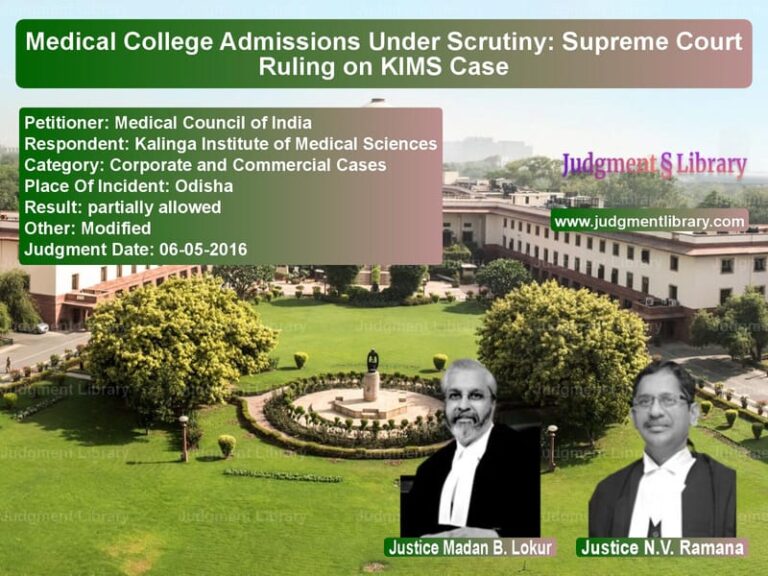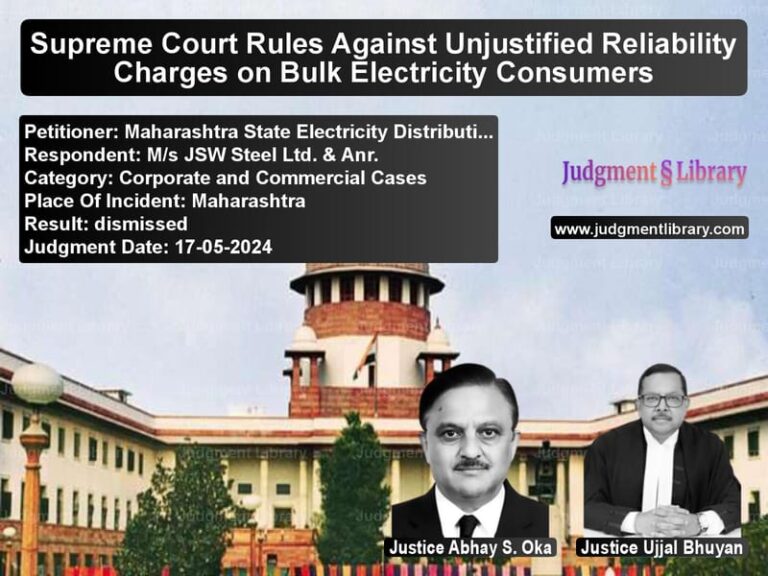Supreme Court Dismisses Contempt Petition in Property Dispute Due to Lack of Clear Non-Compliance
In a significant ruling, the Supreme Court of India dismissed a contempt petition filed by the legal heirs of Mst. Kalli (deceased) against the respondents, including Chokla @ Chowkhram and others. The petitioners alleged non-compliance with the Court’s order in Civil Appeal No. 5559/2017 regarding a long-standing property dispute. However, the Supreme Court found that no case of contempt was made out and ruled that contempt jurisdiction cannot be used to reopen or revisit settled legal disputes.
Background of the Case
The property dispute in question involved the legal heirs of Mst. Kalli, who had previously sought enforcement of their property rights through the Supreme Court in Civil Appeal No. 5559/2017. The Court had earlier issued a ruling on the matter, directing the proper execution of land rights. However, the petitioners alleged that the respondents had not complied with the judgment and filed a contempt petition against them.
The petitioners contended that despite the ruling, no alternative arrangements had been made to facilitate their access to the property, effectively depriving them of their legal rights. They sought the Court’s intervention to ensure enforcement through contempt proceedings.
Arguments Presented by the Petitioners
The petitioners, represented by their counsel, put forth the following key arguments:
- The respondents had willfully disobeyed the Supreme Court’s ruling by failing to execute the land division or provide alternative arrangements.
- The lack of compliance with the Court’s ruling amounted to contempt, as it deprived the petitioners of their rightful ownership.
- The respondents had taken advantage of procedural loopholes to evade their obligations, requiring strict judicial intervention.
- The continued non-execution of the judgment placed the petitioners in an unfair and disadvantaged position, necessitating enforcement through contempt proceedings.
Arguments Presented by the Respondents
The respondents, represented by their legal team, countered the allegations with the following points:
- There was no deliberate disobedience of the Supreme Court’s order.
- The execution of the judgment was delayed due to unforeseen practical difficulties beyond their control.
- The petitioners were attempting to misuse contempt jurisdiction to revisit an already settled legal issue.
- The lack of alternative arrangements, while unfortunate, did not constitute a willful violation of the Court’s ruling.
Supreme Court’s Observations and Judgment
After carefully reviewing the case, the Supreme Court ruled in favor of the respondents and dismissed the contempt petition. The Court made the following key observations:
- Contempt jurisdiction is meant to address willful and intentional disobedience of court orders, not to address procedural delays or practical difficulties in execution.
- There was no clear evidence that the respondents had deliberately violated the Supreme Court’s directive.
- Contempt proceedings cannot be used as a substitute for enforcement mechanisms or to reopen issues already settled by judicial determination.
- The petitioners had other legal remedies available to address their grievances rather than invoking contempt jurisdiction.
The Court ruled:
“No alternative arrangements have been made and looking into the overall circumstances of the case, no case of contempt is made out.”
Based on these findings, the Supreme Court dismissed the contempt petition and directed the parties to explore other legal remedies if necessary.
Legal Principles Considered
The Supreme Court’s ruling was based on the well-established principles governing contempt jurisdiction, as reflected in the following precedents:
- State of Maharashtra v. P.K. Pathak – Held that contempt of court must involve clear and intentional disobedience, not mere delays or administrative difficulties.
- Prithawi Nath Ram v. State of Jharkhand – Emphasized that contempt proceedings should not be used to challenge settled legal determinations.
- Ajay Kumar Pandey v. Virendra Kumar Srivastava – Stressed that contempt jurisdiction must be invoked sparingly and only in cases of willful defiance.
- Jhareswar Prasad Paul v. Tarak Nath Ganguly – Explained that contempt actions cannot be a substitute for proper execution proceedings.
Implications of the Judgment
This judgment has far-reaching implications for property disputes and contempt proceedings:
- It clarifies that contempt jurisdiction cannot be misused as a tool to reopen or re-litigate already settled matters.
- It reaffirms the principle that enforcement difficulties must be addressed through proper legal mechanisms rather than contempt proceedings.
- It provides clear guidance to lower courts on the importance of distinguishing between non-compliance due to genuine difficulties and willful defiance.
- It underscores that contempt should be used only in cases of intentional disobedience, not as a means of coercing compliance where procedural delays are involved.
Final Verdict
In conclusion, the Supreme Court’s dismissal of the contempt petition in this property dispute reinforces the principle that contempt jurisdiction should be invoked only in cases of clear and deliberate defiance of court orders. While the petitioners may explore other legal avenues to enforce their rights, the Court made it clear that contempt proceedings are not the appropriate remedy in this case.
The ruling ensures that while the judiciary remains committed to upholding its orders, it will not allow contempt jurisdiction to be misused for reopening disputes or circumventing proper legal enforcement procedures.
Petitioner Name: Mst. Kalli (D) through legal heirs.Respondent Name: Chokla @ Chowkhram & Ors..Judgment By: Justice Dinesh Maheshwari, Justice Vikram Nath.Place Of Incident: India.Judgment Date: 17-12-2021.
Don’t miss out on the full details! Download the complete judgment in PDF format below and gain valuable insights instantly!
Download Judgment: mst.-kalli-(d)-throu-vs-chokla-@-chowkhram-&-supreme-court-of-india-judgment-dated-17-12-2021.pdf
Directly Download Judgment: Directly download this Judgment
See all petitions in Property Disputes
See all petitions in Specific Performance
See all petitions in Judgment by Dinesh Maheshwari
See all petitions in Judgment by Vikram Nath
See all petitions in dismissed
See all petitions in supreme court of India judgments December 2021
See all petitions in 2021 judgments
See all posts in Civil Cases Category
See all allowed petitions in Civil Cases Category
See all Dismissed petitions in Civil Cases Category
See all partially allowed petitions in Civil Cases Category

